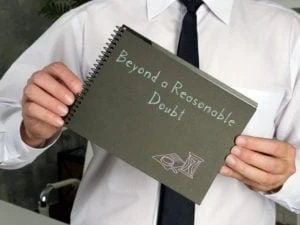
If you are facing criminal charges, you should know the answer to this question: What is proof beyond a reasonable doubt?
Proof refers to alleged proof of guilt. When one says there is “proof [of guilt] beyond a reasonable doubt,” they have no doubt that the defendant is guilty. A juror may have some doubt but must be “virtually certain” that the defendant is responsible (Legal Information Institute (LII).
If there is any reasonable doubt that the defendant is guilty, then a juror must rule not guilty. A Houston criminal defense lawyer from our firm will break down what proof beyond a reasonable doubt means.
Which Cases does This Standard Apply to?
Proof beyond a reasonable doubt is the legal standard in criminal cases, which include:
- Murder
- Assault
- Drug charges
- Weapons charges
- Manslaughter
- Prostitution
- Driving while intoxicated (DWI)
- Sex crimes
- All other alleged criminal offenses
For a legal consultation, call 713-225-1900
Understanding Levels of Proof
There are different levels of proof in legal cases. Everyone’s heard of proof beyond a reasonable doubt and thinks they know what it means. But in Texas, it’s not specifically defined, so what we can do is compare these other levels of proof just so you can get an idea of how high proof beyond a reasonable doubt is.
- Reasonable suspicion. Cops must be able to prove reasonable suspicion to pull over or detain someone. Reasonable suspicion means that a “reasonable person” would suspect some sort of offense is being committed.
An example of reasonable suspicion is when an officer initiates a traffic stop. They believe that some crime is being or has been committed. So they initiate the traffic stop and then they investigate. And let’s say they investigate and decide they think that a crime has been committed. At that point they have probable cause.
- Probable cause is what it takes for them to make an arrest. So if someone has been arrested, an officer has probable cause. That’s different from proof beyond a reasonable doubt. This is what it takes to land you in court.
- Higher than probable cause is a preponderance of the evidence. A preponderance of the evidence is used in civil cases; it means it’s more likely than not. So if there is a dispute, usually involving money or injury, evidence has to be presented to find someone was more likely than not responsible. So 51%. If there is evidence that shows 51%, that person wins. That’s a civil case.
- Now, even higher than preponderance is clear and convincing evidence. An example of clear and convincing evidence is when there is an allegation of abuse or neglecting children. So the state investigates, and they have to determine if there is enough evidence to rise to the level of clear and convincing evidence to take someone’s kids away. Taking someone’s kids away is pretty extreme. You’ve got to understand, we are getting pretty high on these levels here.
- Even higher is proof beyond a reasonable doubt. In a criminal case, proof beyond a reasonable doubt is what’s required. So if you have small doubt or bigger doubt (any reasonable doubt at all), jury members must find someone not guilty.
Why do Criminal Courts Use the “Proof Beyond a Reasonable Doubt” Standard?
The U.S. Constitution’s Due Process Clause establishes this standard. Per Constitution Annotated, “the Due Process Clauses of the Fifth and Fourteenth Amendments [protect] the accused against a conviction except upon proof beyond a reasonable doubt of every fact necessary to constitute the crime with which he is charged.”
The courts use this standard because of the great consequences of a conviction. Defendants in criminal cases may face:
- Death
- Jail time
- Prison time
- Probation
- Significant fines
- Loss of their livelihood
- Loss of their children
The consequences of a criminal conviction can be devastating. By using the relatively high standard of “proof beyond a reasonable doubt,” courts encourage jurors to make careful decisions. The jury must be certain of the defendant’s guilt before issuing a decision.
This helps prevent innocent people from spending time behind bars or even being put to death.
What does the “Proof Beyond a Reasonable Doubt” Standard Mean for Defendants (and Their Lawyers)?
Knowing what proof beyond a reasonable doubt is can help defendants make crucial case-related decisions. A defendant may decide to accept a plea deal or proceed to trial based on this standard. If a lesser standard of proof were present, a defendant might be more likely to settle – though defense decisions are not always this simple.
Lawyers should always consider the standard of proof when advising a client.
Click to contact our Houston lawyer today
What Rights do Criminal Defendants Have?
The criminal defendant is presumed innocent until proven guilty. The burden is on the prosecution to prove guilt, not on the defendant to disprove guilt. The presumption of innocence is a right.
Criminal defendants also have the right to:
- Hire an attorney (or apply for a court-appointed attorney)
- A trial by a jury of their peers
- Be free from self-incrimination (as outlined by the Fifth Amendment of the U.S. Constitution)
- A speedy trial
- Due process
- Equal protection, which prevents unfair rulings or sanctions based on a defendant’s personal characteristics
- Confront their accusers
- Be free from double jeopardy, or being charged twice for the same offense
- Reasonable bail
A lawyer can help their client exercise their rights.
Ineffective Assistance May Violate a Defendant’s Rights
Defendants don’t just have a right to representation – they have a right to adequate representation. If a court finds that a defendant’s attorney was incompetent, then the defendant may have a path to restore their rights.
You don’t want to risk conviction with an incompetent or inexperienced lawyer. Our team is dedicated to Keeping Innocent People Innocent and has the track record to prove it.
Complete a Case Evaluation form now
What Criteria Should You Seek in a Criminal Defense Lawyer?
A criminal defense lawyer serves a critical role: to fight for the most favorable possible outcome to your case. Depending on the case, you may seek a reduction or dismissal of charges or a ruling of not guilty. In other cases, the best outcome may be a favorable plea deal. You can trust your lawyer from our firm to fight for you.
When you’re looking for a lawyer, you may seek one who:
- Handles your specific case type
- Has experience in your jurisdiction
- Has achieved favorable outcomes for defendants in similar circumstances
- Has favorable client reviews
- Has ample resources – paralegals, the budget to hire experts, and a strong team
- Can speak knowledgeably about your case, showing that they take your defense seriously
- Has a plan for your defense
Your choice of criminal attorney could be one of your most important. When you call our team, you can learn more about our experience, our successes, and what we can do for you.
What does a Criminal Defense Attorney Do for Clients?
Your criminal defense lawyer may:
Gather All Relevant Facts and Evidence
The right fact, piece of evidence, or witness account could make or break your defense. Your lawyer and team will seek all relevant facts and evidence. We will safeguard all evidence that we obtain.
Create a Defense Based on the Facts
Your lawyer will prepare a defense regardless of whether your case goes to trial. We will need to argue for innocence or leniency depending on your circumstances. In either case, you need a strong defense.
Our team always does everything we can to poke holes in the prosecution’s case. This makes it very difficult for them to prove that a defendant is guilty beyond a reasonable doubt. For example, let’s say you were arrested for assault. A Houston assault defense lawyer would attempt to establish reasonable doubt that you committed the assault.
Engage with the Prosecutor
A prosecutor is a key piece of any criminal case. Your lawyer may speak with the prosecutor about potential settlement offers. Depending on our interaction, the prosecutor may agree to resolve your case in a favorable manner.
Negotiate a Deal
If it is the right move based on your case, then your lawyer will negotiate for the best possible plea agreement.
Complete Your Trial
Your lawyer will lead your defense through a trial by:
- Presenting evidence that serves your defense
- Presenting and questioning witnesses
- Rebutting arguments made by the prosecutor
- Casting doubt on unfavorable evidence
- Making a comprehensive argument in your defense
A lawyer is an invaluable resource. Consider the stakes of criminal cases, as you may want all the help you can get.
Call Blass Law About Your Case Today
Blass Law will work hard to get you the best possible outcome. It is important that you call the team as soon as possible. We will maximize every moment when crafting your defense – the sooner you call, the more time we’ll have.
Our team is available 24/7 for you. Call Blass Law today to get started. We will review your case, determine how we can help, and explain the next steps for your defense.
Call or text 713-225-1900 or complete a Case Evaluation form



